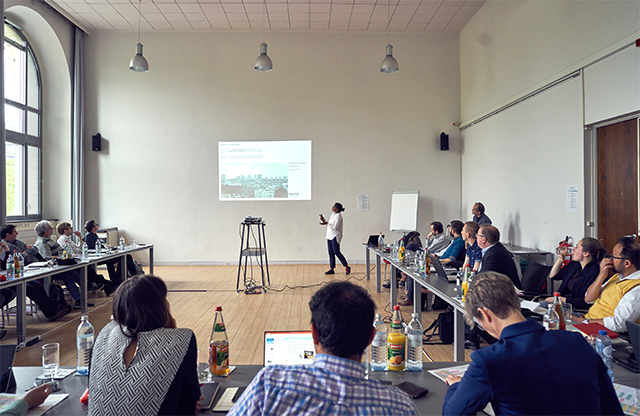
On 2 May 2017, the 4th VELUX Daylight Academic Forum was held at Technische Universität Berlin. This year, 22 PhD students from 10 countries met to share their current research projects with a panel of other fellow PhD students and a panel of leading scientific experts from around the world.
The Academic Forum is held in connection with the biennial VELUX Daylight Symposium. The aim of the forum is to provide an opportunity for PhD students to discuss their current research projects and to receive critical feedback at an early stage of a research project. The forum creates space and time for students to discuss research methodology and how they can arrive at better results with their experiments.
The format of the VELUX Academic Forum allows students to network within and discover the breadth of the daylight research field. Each student was invited to present a brief overview of their research to all attendees and experts. Students were then placed in workshop groups where they made in-depth presentations of their research and received constructive feedback on the methodological aspects of their work.
The scientific experts supporting the discussion are:
- Professor Steve Fotios, University of Sheffield, UK
- Professor Kevin Houser, Penn State University, US
- Professor Alex Rosemann, Eindhoven University of Technology, NL
- Professor John Mardaljevic, Loughborough University, UK
- Professor Werner Osterhaus, Aarhus University, DK
- Dr. J. Alstan Jakubiec, Singapore University of Technology and Design, SG
- Dr. Martine Knoop, Technische Universität Berlin, DE
- Dr. Jan Wienold, École polytechnique fédérale de Lausanne, CH
- Dr. Jens Christoffersen, VELUX Group, DK
A range of daylight topics, illuminated from different perspectives, approaches and applications, will be explored and shared among the students attending:
- Ahmad Kotbi, Cardiff University, Using Mashrabiya to enhance daylighting and PhD Candidate maintain privacy in girls’ schools in Saudi Arabia
- Aicha Diakite, Technische Universität Berlin, Development and Application of Spectral Sky Models in Urban Planning
- Bengt Sundborg, KTH, Royal Institute of Technology, Daylight in Town Planning
- Clara-Larissa Lorenz, Cardiff University, Parametric Processes for Daylight Optimization
- Clotilde Pierson, Université catholique de Louvain, Discomfort glare from daylighting: study of factors influencing discomfort glare perception and validation of a universal discomfort glare index
- Corentin Haubruge, Université catholique de Louvain, Enlighted space as architectural project in Vermeer’s paintings
- Gillian Treacy, The University of Edinburgh, How can we use translation tools to encourage engagement with daylighting in architecture?
- Giorgia Chinazzo, École polytechnique fédérale de Lausanne, Effects of visual and thermal stimuli interactions on comfort perception
- Iason Bournas, Lund University, Low-energy daylit dwellings in the dense city – Benchmarks, metrics and tools securing good daylighting, low energy use and user acceptance
- Jean-Denis Thiry, École polytechnique fédérale de Lausanne, Typologies of primary school architecture in Switzerland from 1945 to 2015: a comparative analysis of their form and daylighting strategy
- Kynthia Chamilothori, École polytechnique fédérale de Lausanne, Evaluating spatial ambiences through daylight variability, contrast and view
- Luigi Giovannini, Politecnico di Torino, Transparent adaptive façades: a novel approach to optimise global energy performance and comfort for the occupants
- Marta Benedetti, École polytechnique fédérale de Lausanne, Determining the lighting comfort zone in office buildings, illuminated by daylight
- Motamed Ali, École polytechnique fédérale de Lausanne, Toward Proper Evaluation of Light Dose in Indoor Office Environment by Luxblick Glasses
- Nils Weber, Technische Universität Berlin, Development of a simplified, spectral and direction-dependent daylight sensor
- Paul Kenny, Loughborough University, The Spectral Microclimate of Indoor Spaces
- Peter Hansen, École polytechnique fédérale de Lausanne, Visual Comfort: Contrast Glare and Sensitivity
- Priji Balakrishnan, Singapore University of Technology and Design, Daylight as a Genius Loci: Characterising daylight of outdoor built environments for perception of comfort and character
- Sofie Linnebjerg, Aalborg University, Double Dynamic Lighting
- Thijs W. Kruisselbrink, Eindhoven University of Technology, A practical device for measuring daylight
- Victoria Eugenia Soto Magán, École polytechnique fédérale de Lausanne, Alerted by Architecture: Direct non-visual response to external stimuli in office buildings
- Yujie Wu, École polytechnique fédérale de Lausanne, Self-sufficient lighting systems



